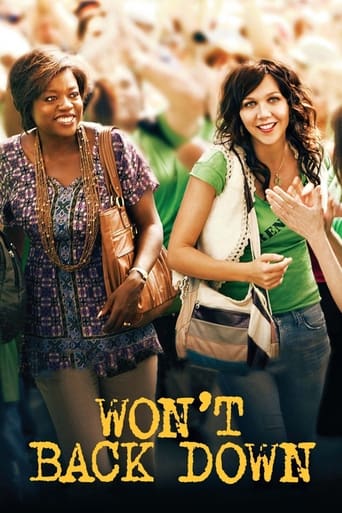

"Won't Back Down" stars Maggie Gyllenhaal and Viola Davis as a pair of women who attempt to transform a failing public school. Though faced with complacent teachers, corrupt principals and intractable unions, the duo succeed in using "parent trigger laws" to form a "charter school". Such schools wrestle administrative control away from the state and toward other concerned parties.A number of recent films have touted the merits of charter schools ("The Lottery", "Waiting for Superman", "The Cartel" etc). Most of these films are funded by millionaires, billionaires and conservative lobbying groups. All present charter schools as being "good alternatives" to "inept government schools" and their "corrupt teachers' unions". In reality, though, charter schools have become yet another means of further monetising society, many run for profit by corporations who have become expert at siphoning public money. Though conceived with good intentions – to provide more power and freedom to teachers – these schools have increasingly become a tool to break up public education, offer lucrative supply contracts to partner companies and rake in profits.Unsurprisingly, most of these films delight in attacking teachers. Teachers, who are faced with increasingly slashed salaries and pensions, and who have repeatedly had their collective bargaining rights weakened (or outright abolished), are presented as villains. Rather than factors like poverty and under-funding, "failing schools" are exclusively "their fault". The cure? More privatisation. This has been standard operating procedure for several decades: make sure things don't work, wait for people to get angry and then hand the reigns over to private capital."Won't Back Down" is engaging, well-shot and features wonderful performances by Davis and Gyllenhaal. Like most films which pretend to be about "social issues" and "the contemporary problems of ordinary Americans", it is also superficial, sanitised, kowtows to the status quo and was funded by those with a clear agenda (conservative billionaires Rupert Murdoch and Philip Anschtuz). Today, the homogeneity of both the classroom and cinema are in many ways a result of similar systems of financing, distribution and exclusivity; capitalism's organisational models breed specific outcomes. The film co-stars Oscar Isaac and Holly Hunter. Both play unionists who learn the errors of their ways. Sneaky.7.5/10 – See "Half Nelson" and "Detachment".
... View MoreIf not for the emotional resiliency of the two lead actresses, this 2012 feel-good drama about the reformation of a failing inner-city Pittsburgh school would come across as no more than a polemic. However, Maggie Gyllenhaal ("The Dark Knight") and Viola Davis ("The Help") bring enough intense fervor to their roles of parent and teacher that this becomes a creditable film if not all that memorable. Director and co-screenwriter Daniel Barnz doesn't help matters much by stacking the deck so predictably in the script (co-written with Brin Hill) while tackling a serious exposition problem with a lot of education jargon that feels like it requires the viewer to take some preparation exam to watch it. Watching Davis Guggenheim's 2010 documentary, "Waiting for 'Superman'", is helpful since it covers similar territory by showing how students strive to become accepted into a charter school.The plot here takes a more contrived route as it focuses on Jamie, a single mom holding down two jobs while becoming increasingly concerned about the lack of attention her eight-year-old, Malia, receives from her teachers in treating her dyslexia and dealing with bullies. Through happenstance, she finds a little-known piece of legislation based on California's "parent trigger" law, which allows parents and teachers, under certain circumstances and after rounds of approvals, to take over schools and run them entirely. This motivates Jamie to partner with Nona, a teacher at Malia's school, who has similar frustrations from an insider's perspective but has been stymied time and again by the system. The movie then takes us on their journey running through all the bureaucratic red tape that you would expect from an inspirationally- minded drama.I give credit to Barnz and Hill for at least presenting a compelling argument against the cause by showing how the teachers' union would suffer major setbacks along the way. As Jamie, Gyllenhaal does her best work since her compelling turn as the struggling drug addict-mother in 2006's "Sherrybaby". She brings loose-limbed passion to her character's relentless drive toward realizing a charter school for her daughter. At first, Davis appears underserved by the script, but this actress has no problem conveying the gravitas and compassion needed to make Nona's evolution feel realistic. As Evelyn, the president of the teachers' union, Holly Hunter ("Broadcast News") - who would have likely played Jamie a couple of decades ago – brings palpable conviction to her character's increasing moral conflict. It's good to see Rosie Perez ("Fearless") again on screen as Nona's sympathetic fellow teacher. Other supporting turns amount to stereotypes as dictated by the script. The subject of the film is quite worthwhile, but the treatment needed far more texture.
... View MoreDVD from my public library. It is "inspired" by real events but there is no way of knowing how much of it is fiction. My wife and I enjoyed it.Set in Pittsburgh, Maggie Gyllenhaal is a single mother Jamie Fitzpatrick. She has a young daughter, in 2nd grade, doing poorly in reading and not getting much sympathy or help from her public school teacher. When Jamie one day comes to the school and asks the teacher if she could spend a few minutes at the end of the day helping her daughter, the teacher responds flatly "School is over at 3PM." Part of that reflects the strong teachers union rules, and part of it is teacher apathy.Jamie is intelligent but not very well educated, partly because of her dyslexia, the same handicap causing her young daughter's difficulties. In her efforts to find a better classroom, or a better school, she learns of a new law which allows teachers and parents to take control of a school via petition to the school board. She is warned that it is an uphill battle, may take years to do, and no guarantee that it will work. But Jamie can't wait years, her daughter needs better instruction now, so she goes about attempting the seemingly impossible. The second key character in this story is Viola Davis as Nona Alberts, one of the teachers who cares about the kids, and who also has a young son with learning difficulties. Jamie has to work very hard to convince her, but eventually and together they move the project forward.Why did we like this movie? The actors bring these characters to life and, even if it didn't really happen this way, it is a good story about the human spirit and the need, everywhere, to focus on the children and their learning. Teachers and their unions are never the prime focus. As the movie says near the end, the meaning of life is to make a difference in the life of a child. We hope it is a positive difference.
... View MoreHaving been a public school teacher for 28 years of my adult life, I was very interested in this movie. It didn't disappoint. The portrayal of the inner city school was accurate and true.Maggie Gylenhael and Viola Davis playing respectively a desperate mother with a dyslexic child and a disillusioned teacher do a great job. The performances are sincere. There are no stereotypes.The script moves right along and is never boring. There are other good performances especially Holly Hunter as a a union supporter with some qualms about her position.Heartfelt and sincere. "Won't Back Down" is a winner.
... View More